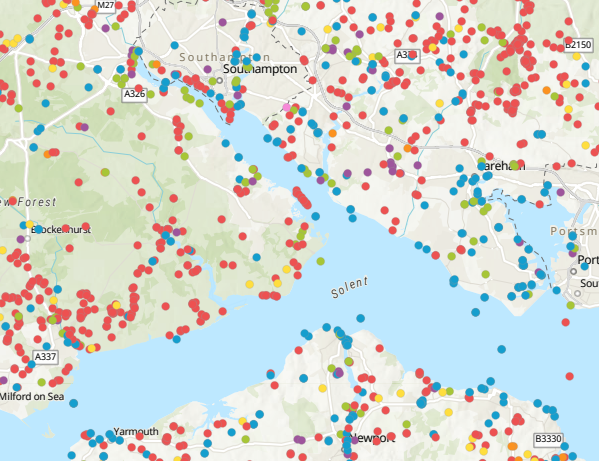
Ports are critical infrastructure that serve as hubs for trade, commerce, and transportation. Ensuring good water quality in and around ports is crucial for environmental sustainability, human health, and protecting marine ecosystems. They, and the wider marine industry, can be a source of various types of pollution, including sedimentation, oil and chemical spills, sewage discharge, emissions from ships and industry-related activities such as cargo handling and industrial operations.
There are regulations and guidelines in place to manage water quality in ports and marine industry for parameters such as water clarity, dissolved oxygen levels, pH, nutrient concentrations, and contaminant levels. Industry and regulators typically monitor water quality in and around sites to track changes over time and identify potential pollution sources. Under the Environmental Permitting (England and Wales) Regulations 2016 permits are needed to carry out a wide range of specified activities lawfully for activities that might pollute the air, water or land. You can search for information on environmental permits on the public register. The consented discharges shown on the map are environmental permits to discharge liquid effluent or waste water to surface water or the ground. Surface waters include rivers, streams, estuaries, lakes, canals or coastal waters. The green dots show trade permits, orange, red and blue are sewage related activities.
Many activities, including marine ones, need a Water Framework Directive (WFD) assessment as part of any application to the public body that regulates and grants permissions. This looks at the impact industry activities such as dredging may have on the immediate water body and any linked water bodies up to one nautical mile.
Ports and marine industries commonly implement various measures to mitigate water quality impacts, such as installing pollution control devices, implementing best management practices for stormwater runoff, enforcing regulations on ship emissions and discharges, and conducting environmental impact assessments for development projects.
Climate change can impact water quality at sites of marine infrastructure through factors such as sea level rise, altered precipitation patterns, increased storm intensity, and ocean acidification. These changes can exacerbate existing water quality challenges.
A Port Waste Management Plan (PWMP) is a document produced by a port or terminal unifying its policy on waste reception facilities for ships and outlining the facilities available at the location.
Please refer to our page on oil spills for more information.
Maritime industry can be a source of plastic pollution at both the micro and macro level. Please see our pages on microplastics and litter for more information.
In the UK, water companies are regulated entities operating within a regulatory framework overseen by various regulatory bodies, primarily the Water Services Regulation Authority (Ofwat) for England and Wales. Southern Water and Portsmouth Water cover the Solent area.
The Solent region serves as the UK's premier marine cluster due to its geographical location, sound business base, research facilities, and educational institutions. This sector is a significant contributor to the region's economy, generating 20.5% of the Gross Value Added (GVA) and sustaining 40,000 jobs across more than 3,000 businesses. Projections indicate a growth rate of at least 5% by 2025. Key to the region's maritime prominence are its strategically positioned ports in Southampton and Portsmouth. These ports serve as vital gateways to global markets, with Southampton facilitating automotive exports and being the UK's busiest cruise port, while Portsmouth specialises in 'Roll-on, Roll-off' traffic to destinations like France, Spain, and the Channel Islands.
The Solent region excels in marine manufacturing, Portsmouth Naval Base acts as a hub for high-tech defence and advanced manufacturing, contributing over £1.6bn of GVA and supporting 20,000 jobs. The area is also renowned for providing leisure marine activities and emerging sectors and technologies, including composite manufacturing, marine autonomous systems, and offshore wind and tidal energy. The Isle of Wight is a hub for composite materials development hosting facilities for companies like GKN, GURIT, BAE Systems, and Vestas.
Fawley Oil Refinery is owned and operated by ExxonMobil, and is one of the company's largest refineries in Europe. It operates under strict environmental regulations to minimise its impact on the environment implementing measures to manage air emissions, water discharges, waste management, and emergency response planning.